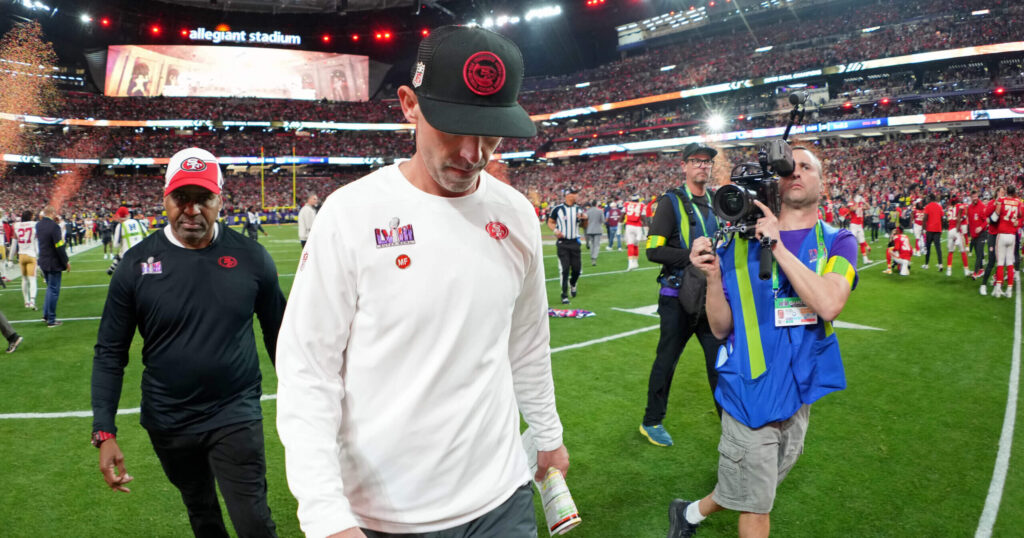The Kansas City Chiefs and San Francisco 49ers traded punches for 74 minutes and 57 seconds in Super Bowl LVIII. Sunday’s game was a heavyweight fight worthy of its host city, Las Vegas – a town with an illustrious history of championship boxing bouts.
The final blow was delivered by Chiefs quarterback Patrick Mahomes at the end of the fifth overtime quarter. Mahomes caught the snap, rolled right, and threw a three-yard pass toward the right side of the goal line to receiver Mecole Hardman for the game winning touchdown. Kansas City 25, San Francisco 22.
As Chiefs players stormed the field under a shower of red and yellow confetti, the losing coach of the Niners, Kyle Shanahan, slowly walked onto the field with a stunned expression on his face. He seemed unsure what to do or say. Shanahan just coached one of the best games of his career, but it wasn’t enough. And because of that, fans and pundits will continue to ask the question that dominated Super Bowl week.
Will Shanahan ever win the Big Game?
Despite what the Allegiant Stadium scoreboard read, Shanahan did not lose this Super Bowl. Mahomes won it.
On the Chiefs final drive of overtime, the Niners were one play and one yard away from victory. Kansas City faced 4th-and-1 on their own 35-yard-line. San Francisco opened overtime with a field goal after a 13-play, 66-yard drive that lasted 7:38. If the Chiefs didn’t convert, the game was over.
But Mahomes ran right for eight yards. First down. Seven plays later, Mahomes kept it again for a 19-yard scamper to the San Francisco 13-yard-line. The final ringside bell rang three plays later after Mahome’s second touchdown pass of the game. It put an end to the seventh longest game in NFL history and just the second overtime in Super Bowl history. The first and last one came in Super Bowl LI in 2017, when the New England Patriots defeated the Atlanta Falcons 34-28.
The offensive coordinator of the defeated Falcons was of course Shanahan, whose team squandered a 28-3 lead to Brady’s Patriots. Three years later, Shanahan lost Super Bowl LIV, his first with San Francisco, to the Chiefs 31-20. Again, Shanahan had a late lead, up 10 points in the final quarter.
Despite his stellar 8-4 postseason record, Shanahan has lost three Super Bowls and two NFC Championship games in five of the last eight NFL seasons. That’s what his critics will point to.
Naysayers can’t discredit his team’s effort and strategy on defense. The Niners suffocated the defending champs and nearly shut out Mahomes in the first half for just the third time in his 113 career starts.
On the offensive side of the ball, Shanahan drew up a perfect trick play to take a 10-0 second quarter lead when receiver Jauan Jennings threw a 22-yard touchdown pass to running back Christian McCaffrey. There was nothing flukey about the Niners 10-3 halftime lead. San Francisco dominated the line of scrimmage on both sides of the ball. The defensive line quartet of Chase Young, Nick Bosa, Arik Armistead, and Javon Hargrave didn’t allow Mahomes to get comfortable and play like his usual self for much of the game. Their pressure forced Mahomes to scramble east and west rather than step up in the pocket. Mahomes even threw an interception on the first drive of the second half. After the first five drives, the Chiefs had as many fumbles as first downs (three).
The Chiefs had two turnovers and committed six penalties for 55 yards. The Chiefs gave the Niners an opportunity to take the game, but San Francisco couldn’t take advantage. One reason was their third quarter play calling, where Shanahan went away from the recipe that had led them all season – putting the ball in McCaffrey’s hands. The Niners went three-and-out on their first three possessions of the second half and gained a total of three yards.
Shanahan didn’t give the ball to McCaffrey once. His five-yard carry on their fourth drive with two minutes left in the third quarter was McCaffrey’s first touch since his touchdown reception in the second quarter.
This was his biggest flaw.
Shanahan dialed up three more McCaffrey runs enroute to Purdy’s 10-yard touchdown pass to Jennings with 11:22 remaining in the fourth quarter to give San Francisco a 16-13 lead. It was the Niners lone touchdown drive of the half.
Prior to that, the Niner’s scoreless third quarter was a result of Shanahan’s reliance on the passing game. Purdy only completed only two of his first eight passes, including four consecutive completions. The Chiefs, meanwhile, scored nine points in the quarter courtesy of three Harrison Butker field goals. This is where the game got away from the Niners, and Shanahan will likely wish he stuck with what got him there.
The offensive ineptitude allowed the Chiefs to stay in the game and they eventually capitalized on San Francisco’s lone second half turnover. After a Kansas City three-and-out, San Francisco muffed the ensuing punt when the ball caught the foot of 5th-round rookie Darrell Luter and the Chiefs recovered it on the Niners 16-yard line. Kansas City scored on the very next play from a 16-yard pass to receiver Marquez Valdez-Scantling and took their first lead of the game. Credit Shanahan for pivoting his play calling approach. The Niners scored on their final three possessions (one touchdown and two field goals) and it got them within a play of winning their first Super Bowl in 29 years.
If the muffed punt or McCaffrey fumble on the first drive doesn’t happen, maybe the game ends with a different shade of red and gold confetti on the field. But then again, Kansas City made their fair share of miscues as well. Fortunately for them, they had one of the greatest quarterbacks of all time under center.
On the Niners side, Shanahan did so many things right in the game, outside of the third quarter and overtime. After winning the coin toss, Shanahan elected to receive the ball. This makes sense in the regular season. The first team to score a touchdown wins the game. But with the new overtime rules, each team gets one offensive possession regardless.
Common sense says electing to play defense is the logical strategy. Let the other team’s offense take the field first so that you know what you must do offensively when it’s your turn. If the other team scores a touchdown, going for a two-point conversation to win the game is an option on the table if your team responds with a touchdown. Or, if the other team only gets a field goal, your team knows a touchdown will win the game.
That’s exactly what happened on Sunday. The Niners went first and had to settle for a field goal.
Had the Chiefs gone first and scored a touchdown on their first possession, San Francisco would have had an opportunity to go for it on fourth down on their ensuing drive. Shanahan’s decision to go on offense first robbed his team of more opportunities to win the game. Small deficiencies like this one are why his team fell short in the Big Game, again.
This one will hurt for a long time. Maybe forever. But Shanahan can take solace by reflecting on the man across the sideline from him on Sunday. Chiefs coach Andy Reid was once fired from the Philadelphia Eagles for not getting over the hump. Now with Reid in Kansas City, the Chiefs are just the fourth franchise to win three championships in a five-season span, joining the Patriots, Cowboys, and Steelers. They are
also the first repeat champion in 20 years, since the Patriots in 2004. Reid ignored the critics and now is in the middle of a dynasty.
Shanahan would be wise to take a page from his playbook.


